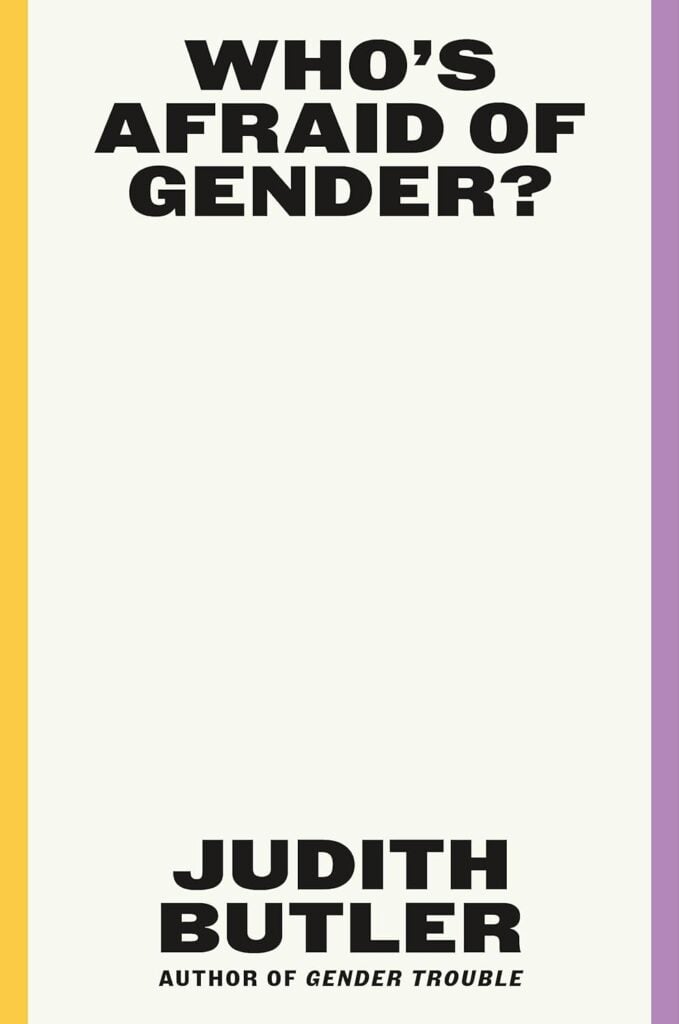by Judith Butler
Farrar, Straus and Giroux
320 pp., $30.00
Somewhere, in an alternative reality, UC Berkeley professor Judith Butler is “the most important philosopher … in the United States.” This is the surreal pronouncement, in the form of a back cover blurb for this book, by another radical ideologue with a professorial platform, Yale’s Jason Stanley. In his enthusiastic praise of Butler, Stanley makes sure to fit a preferred pronoun (“they”) into his statement, just in case you were wondering how firmly Stanley is on board with the gender revolution Butler has championed for more than three decades.
Judith Butler emerged onto the public intellectual scene after her 1990 book Gender Trouble was taken up in the radical community as a manifesto on sex and gender. In that bizarre work, Butler argued that dressing in drag is a revolutionary act that reveals gender’s utter “constructedness” and thereby helps free us all from the constraints of heteropatriarchal social order. Translation into English: Men outrageously playacting at being women is the way toward a better world.
Nothing Butler has written or said since Gender Trouble gives us a reason to take her work any more seriously. The truth of the matter is that Butler is not a philosopher at all, at least not in the tradition of philosophy established in the West by Socrates and those who followed him.
Philosophy is, etymologically and in intellectual history, the love of wisdom pursued through honest and total commitment to the truth. Butler has frequently aligned herself with the relativists who do not believe that truth exists. She made this crystal clear recently in declaring that a debate was possible “about whether [Hamas] did the right thing” in its slaughter of Israeli citizens on Oct. 7, 2023.
A sophist is dedicated not to the pursuit of truth but instead to the propagation of confusion and falsehoods, cleverly packaged in obfuscating and gaudy rhetoric, which advance the sophist’s interests. Those interests vary. Sometimes, sophists are simply looking to be materially rewarded. Sometimes, they advance partisan, ideological claims under the guise of philosophical inquiry. And sometimes, they do both. Butler is this kind of sophist. She has made out of her gibberish a lifelong, well-paid gig at Berkeley, and she endeavors to advance her own radical worldview through her sophistical skills.
We learn at the outset of Who’s Afraid of Gender? that it is the “anti-gender ideology movement” that has made gender and sex something problematic. You see, before right-wingers started illegitimately freaking out about these topics, all they amounted to were “mundane box[es]” to check on official forms that “most of us” filled unproblematically. Oh sure, some wanted more boxes, or none at all. But this was low-level tension, certainly nothing like, say, a cultural revolution in which leftists make a concerted effort to dismantle all traditional sex and gender norms and to introduce into law, education, and public culture caustically anarchic ideas about sexuality and gender.
Butler assures us that none of the trouble hallucinated by conservatives is happening. She laughs at those who imagine that “certain words are … so powerful that only through censorship is there any hope of depriving them of their power” and who “liv[e] in fear of texts, speech, images, and performances.”
Butler is counting on her readers being insufficiently knowledgeable about what she has said elsewhere to recognize that this accusation is inconsistent with her own view of language. She has consistently argued throughout her career that “texts, speech, images, and performances” do indeed have the power to change and perhaps even to create the world. So, which is it? Either words don’t matter, and the conservatives need to lighten up, or, as Butler herself has always argued, they do matter—a lot. If it’s the latter, conservatives are perfectly correct to be concerned about what is allowed into the vocabularies of children on important topics such as sex and gender.
The book is such a tissue of falsehoods that the critic is hard-pressed to know where to begin in pointing them out. I offer a close reading of one example of the sort of intellectual dishonesty that can be found on virtually every page.
In her effort to confuse and ultimately ignore altogether the evidence for biological sex differences, Butler references a 2014 study funded by the International Olympic Committee and the World Anti-Doping Agency on testosterone levels in professional athletes. She claims it showed “16.5% of men had low testosterone levels and 13.7% of women had high testosterone levels.” Look at how many “men” are not really men, and how many “women” are not really women, by the standards of heteropatriarchal “science”!
Her citation is from the study’s abstract, which appears to be all Butler read. Had the most important living American philosopher troubled herself to carefully read the entire study, she would have seen how significantly it qualifies this statement. “Low” testosterone levels for men are calculated by the authors according to the “lower limit of the male reference range,” which is 8.4 nanomoles per liter, or nmol/l. “High” levels for women are determined with reference to the “upper limit of the female reference range,” 2.7 nmol/l. In other words, “low” and “high” here are determined by ranking a particular man’s or woman’s score not against a common standard but against the already sex-differentiated standards. Most of the men and women classed as “low” or “high” in testosterone with reference to their own sex nonetheless have testosterone levels that are not within the typical range of the other sex.
Only about 10 percent of women have scores that get into the male range, and almost all of these are at the low end of that range. Only about 4 percent of male scores fall into the female range, and all at the high end.
Butler’s statement about the comparative testosterone levels of the two sexes (“many women … have greater testosterone levels than many men”) is as far away from the reality presented by these data as it is possible to imagine. The overwhelming majority of women, even when they are professional athletes, have
testosterone levels well below the overwhelming majority of men. The means of the male and female groups in this study are informative as to the typically massive difference between the sexes.
I could, given much more space and the indulgence of very patient readers, extend this example into the dozens with ease. Butler knows her typical reader will not do the homework to check her claims. Books like hers are written not for a critical audience, but for members of an ideological cult looking to have their preconceived beliefs affirmed.
Butler wants her readers to believe that physiological differences related to undergoing male puberty have no discernible effect on the athletic performance of “transwomen.” Yet the biological male in the middle of the male distribution is stronger than nearly all biological women.
“Gender dimorphism,” that is, the fact that men and women are typically of different sizes and shapes, is in Butler’s view implicated in racism and colonialism. “Decolonial theorists” are invoked to claim that the sex binary was illegitimately imposed on African peoples by Western imperialists as part of the effort to dominate them. But, as scintillatingly politically correct scholars such as Oyèrónké Oyewùmí and Zethu Matebeni have argued, indigenous African understandings of sex and gender were more complicated. The “false claim of universality” of the sex binary must be rejected in the interests of liberation. Here, the extreme, relativistic underpinnings of Butler’s worldview are starkly exposed. There is no such thing as human nature, and there is nothing at all that can reliably be found in all human populations. All that we have is endless variation, all equally well-adjusted to the task of life, and we must stop our efforts to find points of commonality in all humans.
In her conclusion—and here we see perhaps the essential reason why Jason Stanley, the author of a book on fascism that is as ill-conceived and shoddily argued as this one is on gender, so dutifully endorses Butler’s work—she informs readers of the nature of the “fascism” of “Trump, Bolsonaro, Orbán, Meloni, and Erdogan.” To be sure, she admits that these are not yet leaders of “fascist states on the order of Nazi Germany,” but “history advises us not to look away from the fascist potentials that are increasingly actualized in several regions of the world through the anti-gender ideology movement.”
Here Butler cites Italian Prime Minister Giorgia Meloni’s defense of the biological heterosexual family. Meloni lauded the only form of family—that is, heterosexual—that is capable of producing offspring. Meloni also criticized surrogacy, saying it “pay[s] a poor mother to keep her child in her womb for nine months and then snatch[es] it from her arms to give it away to whoever had bought it.”
Butler’s point is clear, and disturbing. You must fully accept the moral equivalence of a mother-father family and its biological children with a male homosexual couple raising an unrelated woman’s offspring, which they purchased like any other consumer product. Either that or you are on the road to fascism. This is the sophisticated reasoning style of “the most important philosopher in America.”


Leave a Reply